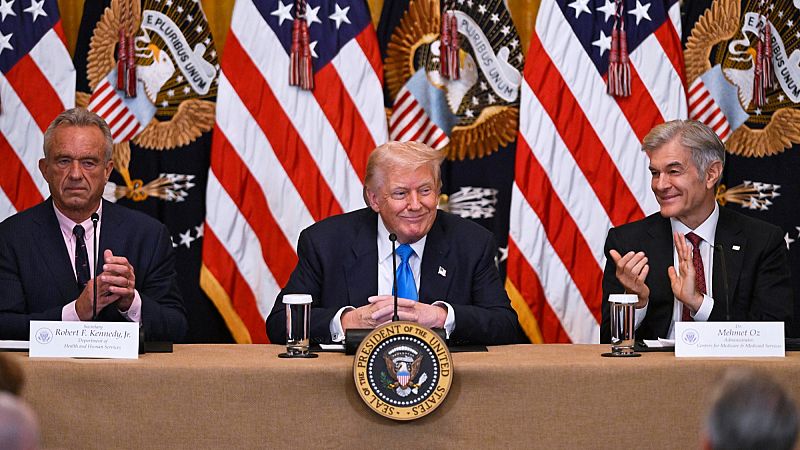
The Trump administration is launching a new programme that will allow Americans to share their personal health data across medical systems and apps run by private tech companies.
Health officials said the initiative will make it easier to access health records and monitor wellness.
More than 60 companies, including major tech firms like Google, Amazon, and Apple as well as American health care giants like UnitedHealth Group and CVS Health, have agreed to share patient data in the system.
The initiative will focus on diabetes and weight management, conversational artificial intelligence (AI) that helps patients, and digital tools such as QR codes and apps that register patients for check-ins or track medications.
“For decades America’s health care networks have been overdue for a high tech upgrade,” US President Donald Trump said during an event with company CEOs at the White House on Wednesday.
“The existing systems are often slow, costly, and incompatible with one another, but with today’s announcement, we take a major step to bring health care into the digital age".
The system, spearheaded by an administration that has already freely shared highly personal data about Americans in ways that have tested legal bounds, could put patients’ desires for more convenience at their doctor’s office on a collision course with their expectations that their medical information be kept private.
“There are enormous ethical and legal concerns,” said Lawrence Gostin, a Georgetown University law professor who specialises in public health.
“Patients across America should be very worried that their medical records are going to be used in ways that harm them and their families," he added.
US health officials who will maintain the system have said that patients will need to opt in for the sharing of their medical records and data, which will be kept secure.
Those officials said patients will benefit from a system that lets them quickly call up their own records without the hallmark difficulties, such as requiring the use of fax machines to share documents, that have prevented them from doing so in the past.
How the data could be used
Some patients travel from across the US for treatment at the Cleveland Clinic. But they often have a hard time obtaining all their medical records from various providers, said Dr Tomislav Mihaljevic, the hospital system’s CEO.
He said the new system would eliminate that barrier, which sometimes delays treatment or prevents doctors from making an accurate diagnosis because they do not have a full view of a patient’s medical history.
Having seamless access to health app data, such as what patients are eating or how much they are exercising, will also help doctors manage obesity and other chronic diseases, Mihaljevic said.
“These apps give us insight about what’s happening with the patient’s health outside of the physician’s office,” he said.
However, the US government has done little to regulate health apps or telehealth programmes, and digital privacy advocates are sceptical that patients will be able to count on their data being stored securely, said Jeffrey Chester from the Center for Digital Democracy.
The US government already has troves of information on more than 140 million Americans who enroll in public health insurance programmes. Earlier this month, the federal agency agreed to hand over its massive database, including home addresses, to deportation officials.
The new initiative would deepen the pool of information on patients for the federal government and tech companies.
Medical records typically contain sensitive information, such as doctors’ notes about conversations with patients and their substance abuse or mental health history.
“This scheme is an open door for the further use and monetisation of sensitive and personal health information,” Chester said.







